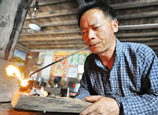
The direction, intensity and pace of the macro regulation should be managed well. The proactive fiscal policy and prudent monetary policy will remain, it said.
Facing the prolonged economic weakening, the central authorities adopted a different approach by not launching a one-off fiscal and monetary stimulus package, but rather introducing a set of market-oriented reforms to boost the intrinsic vigor of the economy.
The government curtailed its own power in approving business projects, cut taxes for micro enterprises and invited private capital to participate in railway construction.
During Tuesday's meeting, the central authorities also agreed to step up support for small and micro-sized businesses, which provide at least 80 percent of the country's jobs and 60 percent of its GDP.
They should enjoy more access to credit and lighter tax burdens, the statement said.
It was also agreed at the meeting that while stimulating consumer spending, it is also necessary to keep reasonable investment growth. The urbanization process should be pushed forward in a proactive and steady way.
Retail sales, a key indicator of consumer spending, increased 12.7 percent from a year earlier. The growth rate picked up by 0.3 percentage points from the January-March period, according to the National Bureau of Statistics.
The growth of fixed-asset investment, a measure of government and private spending on infrastructure, stood at 20.1 percent during the period, down 0.8 percentage points over the first quarter of the year.
Zhang Yongjun, an expert with the China Center for International Economic Exchanges, said that given weak overseas demand, China's economy will have to rely on domestic demand, which has big potential.
Although a one-off stimulus package is unlikely, to prevent the economy from sliding persistently, it is essential to keep investment growth at a certain speed, he noted.
The meeting also reiterated the significance of developing strategic and emerging industries, energy-saving businesses and the service sector.
It underscored the need to stabilize foreign trade. "Export channels should be expanded, and imports should be increased to cope with the trade frictions effectively," according to the statement.
The central authorities also stressed to stabilize prices and strengthen production and supply of major commodities, so as to reduce impact caused by price hikes on people's life.

















 Beijing, Shanghai not listed in top 10 happiest cities in China 2013
Beijing, Shanghai not listed in top 10 happiest cities in China 2013


![]()
